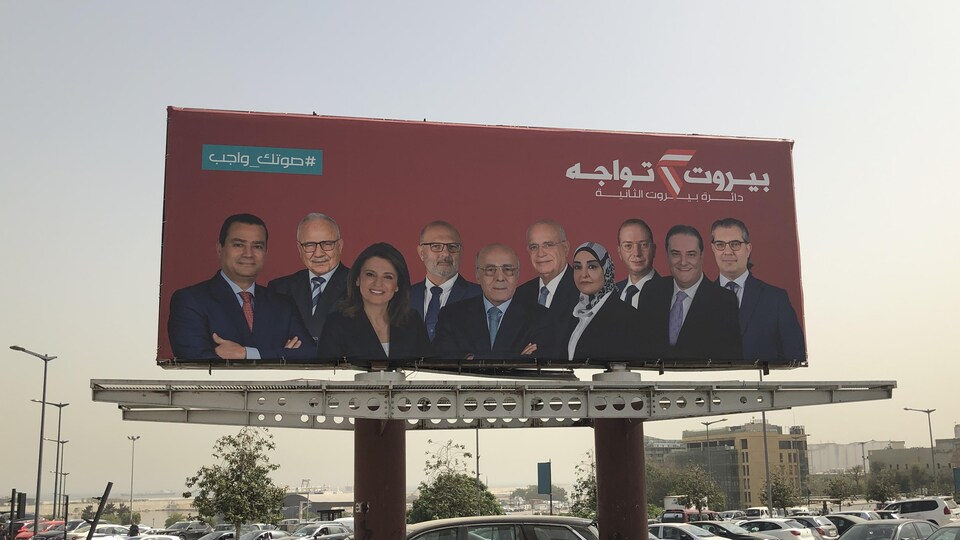Lebanese voted on Sunday to elect their MPs, a first test for independent candidates and opposition groups that emerged following a popular uprising that erupted in October 2019 to demand the removal of a political class accused of corruption and malfeasance. incompetence.
However, the ballot should maintain the status quo in favor of traditional political forces, which are responsible for the worst socio-economic crisis in which Lebanon has collapsed since 2019, experts warn.
Electoral law is adapted to the advantage of the forces in power in a country governed by a community power -sharing system that encourages corruption and clientele.
An important security device was deployed for this election which called on approximately 3.9 million voters to renew 128 members of parliament by 7:00 pm local time (4:00 pm GMT). Results are expected on Monday.
By noon, there were very few people in most places. Local media reported power outages at several polling stations despite promises from the Interior Ministry that power would be provided without delay.
The elections were held in accordance with a law enacted in 2017, to the advantage of the ruling parties, and in the absence of the main Sunni leader Saad Hariri, who boycotted them.
The 2018 legislative elections are led by the powerful pro-Iranian Shiite Hezbollah and its allies, notably the Free Patriotic Movement (CPL) of President Michel Aoun and the Shiite Amal movement of Speaker of Parliament Nabih Berri.
Crisis in the country’s economy
Today, Lebanon has been caught since 2019 in a socio-economic crisis that the World Bank has classified as the worst in the world since 1850 and caused by decades of mismanagement and corruption by a ruling class that has hardly changed within dozens of years. ‘years.
In almost two years, the national currency has lost more than 90% of its value on the black market and the unemployment rate has nearly tripled. Nearly 80% of the population now lives below the poverty line, according to the United Nations (UN).
It was also the first legislative elections since the devastating explosion in the port of Beirut on August 4, 2020, which killed more than 200 people and devastated the entire capital district.
The independent collapse of the economy and the collapse of basic public services pushed large numbers of Lebanese to leave the country.
A large portion of the candidates, including traditional parties and independents, conducted their campaigns with slogans. sovereignsaccuses Hezbollah of serving Iran’s interests and keeping it in Lebanon thanks in particular to a large military arsenal.
In regions where Hezbollah has a strong presence, the voting process has been marred by incidents between supporters of rival formations. According to the Lebanese Association for Election Democracy (LADE), which runs the administration, several of its members were attacked at polling stations, some in Bekaa, a stronghold of Hezbollah.
In the same region, the Christian party Lebanese Forces, which strongly opposes the Shiite party’s weapons, indicated in a statement that some of its delegates had been beaten and expelled from polling stations.
Despite the discontent, the political class is taking advantage of the absence of the state, which is now unable to provide basic services such as electricity, medicine or fuel, to activate their networks of traditional community patronage, aimed at get the favor of voters by offering financial assistance.
The economic collapse is the main cause of change, where the political, social and security aspects are the main consequences of the crisis. economic, researcher Sam Heller wrote in an article published on the site of the American think tank The Century Foundation. Ironically, Lebanon’s first national election since the beginning of the crisis seems unlikely to make much difference.
Vote for change
I’m for change, because we know it’s political kind, hasn’t changed since the civil war ended three decades ago, Nayla said after voting for Gemmayzeh in the capital. For this 28-year-old student, Lebanon desperately needs it new faces.
After voting in the Beirut quarantine, Cynthia Toukajian, a 37 -year -old consultant, said, Hopefully those who participated in maintaining a failed system now feel that they have a duty to participate in cleaning it up by voting. against the parties in power.
” If the election yields a change of only 5%, let us take the first step “
He came to cast his ballot at the open polling station at the fire station in Quarantine, a popular district among the sectors most affected by the harbor explosion.
Behind him are photos of ten firefighters who died trying to put out the blaze that preceded the huge explosion on August 4, 2020.
This explosion was caused by a large quantity of ammonium nitrate, which was stored without caution for several years in a port warehouse, by the admission of the authorities, deemed more responsible for the tragedy because of their negligence and carelessness.
Meanwhile, the investigation stalled. Human rights organizations, survivors and relatives of the victims have called for an independent international investigation, saying that open political interference and safety of senior officials the local investigation failed.
The explosion at the port has exacerbated a particularly difficult situation due to the severe economic crisis.
Lebanese are now finding it difficult to survive on falling incomes, rapid inflation and deficits of all kinds.
It is now or neversaid Léa Ghorayeb, an architect whose apartment in the Mar Mikhael district, adjacent to Quarantine, was also destroyed by the explosion at the port.
The vote is all we have left, if we don’t vote now, we will live in the same sad situation for the next four years.said the thirties.
Source: Radio-Canada
